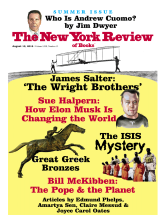To the Editors:
Readers of David Bromwich’s excellent article “Trapped in the Virtual Classroom” [NYR, July 9] that contrasts an online with a physical-space classroom need to think about an additional issue that so far is not receiving much, if any, notice. The online classroom, by virtue of its digital medium, is a surveilled classroom. Teachers and students both will have no privacy there. Because backup is permanent (and many efforts to individualize instruction and provide feedback depend upon the ability to mine the data generated), it will be risky for both faculty and students to explore the outer reaches of ideas, speculate on consequences, examine uncommon or dissident ideas or those subject to intellectual property constraints.
When data and information are confused with knowledge, the mere presence of certain keywords or copyrighted strings will, to the literal-minded, add up to the presence of something suspicious. This is a contagion theory of mental life—that exposure equals adoption. It is one thing to have a talking head broadcasting from the front of the room and quite another to probe ideas for their strengths and weaknesses through a dynamic process. Even dumb ideas may need to be considered to arrive at a more nuanced conclusion but no surveillance system is able to understand this. Who knows who will be looking at what data in the future, drawing unacceptable inferences about political attitudes, loyalty, or professional development?
Neither teachers nor students in such a classroom should feel free to take any intellectual risks in it. We will all be the losers.
Christina Spiesel
New Haven, Connecticut
David Bromwich replies:
I am grateful to Christina Spiesel for bringing out a constraint that arises from the nature of the virtual classroom—a hidden disadvantage in the regime of “openness” that I haven’t seen mentioned elsewhere. All proceedings online are surveilled, and are backed up on a permanent record. This fact alone suggests a host of moral and legal questions that have evaded public discussion; but I would join Spiesel in emphasizing a less obvious drawback. Intellectual argument under surveillance isn’t likely to exhibit the freewheeling quality of an actual classroom. “He who knows only his own side of the case, knows little of that,” wrote Mill in On Liberty. “He must be able to hear [opposing arguments] from persons who actually believe them; from persons who defend them in earnest, and do their very utmost for them.” I suspect the earnestness that may drive opposing judgments can never fully register when the persons “who actually believe them” are only virtually present. If we think candor is a trait of considerable social as well as intellectual value, we should take care how we modify the conditions that have made candor possible.



